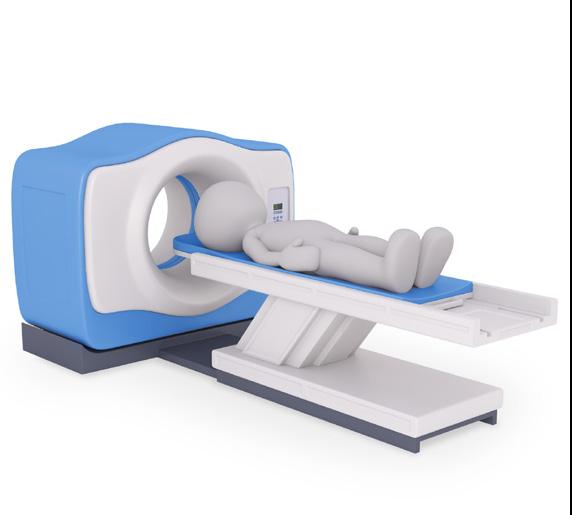
5 minute read
Using digital to cut waiting times
from Health Business 23.2
by PSI Media
Marie Loizides, associate director of performance analytics at Barking, Havering, and Redbridge University Hospitals NHS Trust explains how switching to digital referrals has slashed patient waiting times

When it comes to the nation’s health, we are getting used to seeing big numbers quoted.
One million patients are treated by the NHS every 36 hours. Over seven million people are on the waiting lists. 20 million people have an musculoskeletal (MSK) condition in the UK.
But when you work in the NHS, you know that behind every number is a person with a story. For you, and for them, it’s personal.
And that’s how our journey to rethink how we managed MSK referrals started. Due to organisational boundaries and historical funding, patients needing to access our physiotherapy services were facing waiting times from between 6 to over 26 weeks depending on where they lived.
As a qualified physiotherapist, I was witnessing at first hand the devastating effect long waiting times or incorrect referrals can have on patients. Living with chronic pain impacts on every aspect of someone’s life and restarting the referral process after being referred to the wrong service can delay much needed treatment.
It was our goal to shorten the time between referral to treatment by reducing incorrect referrals.
Reviewing the MSK referral process
The first stage was to carry out an audit of the MSK referral process to see why incorrect referrals were happening and what improvements could potentially be made. The audit revealed some surprising results. As many as 3000 referrals were being rejected each year because they were missing key clinical information. This was causing a delay in the system because if a referral is missing vital information, like blood tests or MRI results, it can’t be processed quickly. This also increases the likelihood that the patient will be sent to the wrong clinic. We knew if we could prevent rejected referrals, it would positively impact on waiting times and ensure that specialists’ diaries were filled with patients who they could treat and not need to refer on.
Our 116 GP practices were using a Wordbased proforma referral form at the time, and we decided we could improve the quality of referrals by making the shift from a paperbased referral system to a digital one. The aim being that valuable appointments weren’t wasted due to incorrect referrals and patient waiting times were kept as short as possible.
I had begun a 12-month Digital Health London Pioneer Fellowship and, with their help, put a business case together to digitally transform the MSK referral process.
Improving the quality of referrals
We wanted to make it easier and quicker for GPs to make accurate referrals. Going digital would enable electronic patient data to be shared securely and easily between primary and secondary care. This would improve the referral experience and ensure patients attended a consultation at the correct clinic the first time.
Bringing clinical decision making into the GP surgery was also a key ambition and with the help of NEC Rego, we developed a clinical algorithm to make our vision a reality. Consultation was a crucial and integral part of the process. We consulted with a wide range of practitioners and experts in patient care, including GPs, primary care providers, hospital clinician consultants and physiotherapists to set different treatment pathways. We then developed and refined the AI algorithm to ensure the agreed right treatment pathway is in place for each condition we treat.
What happens now is that when the GP is with the patient, they can fill in the referral form then and there. The algorithm E
Twice2much Supplier Health Check
Our reviews enable Clients to benefit from a detailed forensic review of their Accounts Payable transactions bespoke to their own organisation.
To draw an anology with our own Health, we would compare our reviews to an MRI/scan approach rather than a GP check-up. The depth of our reviews enables the identification of errors previously unknown to the organisation.

STAGE 1 - Identification/detection
• Access to £100,000’s of technology, analytics and resources
• Access to dedicated experienced professionals
• Provides multiple-layer interrogation of transactions with Suppliers
• Specialist expertise in reviewing Supplier transactions and identifying anomalies
STAGE 2 - Verification/validation
• Expert detailed analysis of transactions at individual Supplier level to validate and investigate anomalies

• Obtaining evidence to support initial findings

STAGE 3 – Recovery/Reporting
• We supply the system, processes and resources to recover the errors found on our Clients’ behalf

• Flexible but targeted reporting provides significant additional benefits to Clients
Our Supplier Health Checks are carried out on a NO RECOVERY - NO FEE basis enabling Clients to benefit from a FREE Health Check if no errors are found.
prompts them with a series of questions to consider, ensuring the patient is referred to the correct service to meet their needs, for example a consultant or physiotherapist.
It is pre-populated with info to avoid errors, so we don’t get paediatric referrals for example, as we are an adult service.
Should further diagnostic tests be needed before a consultation with a specialist, the referral tool will prompt the GP to complete this stage. This helps to cut delays and speed up care for the patient.
Reducing pressures on GP and hospital time
We receive 50,000 MSK referrals annually from the GP practices covered by our trust and it is clear using the digital referral system has vastly improved the patient experience. We’ve reduced patient waiting times by over a month as triaging cases takes half the time it used to take.
It has also supported GPs by making it easier for them to refer. Although we didn’t mandate switching to the digital, process for the first couple of months almost 80 per cent of GP practices adopted it from the beginning, as it was evident the change substantially improved the referral process for everyone.
Prior to digitising the MSK referral process, GPs would need to pass referrals to the practice administrative team to laboriously complete the paperwork and include all the relevant documentation. What GPs are choosing to do now is, to fill out the referral with auto-loaded clinical attachments in less than 90 seconds during the consultation.
This time saving equates to 3.5 minutes for every patient referred for treatment which when added up over the course of a year could save up to 3000 GP hours in our area. This is the equivalent of putting another GP into the health service.
The technology works as it is a clear pathway for clinicians to follow, making it easier for GPs and hospitals to manage referrals into secondary care.

Correct RTT pathways
As a result of the changes we’ve introduced, we’ve seen over 50 per cent reduction in consultant-to-consultant referrals within the trust as the correct RTT pathways are being used.
Now when a patient speaks to their GP about arthritis or another MSK condition, the doctor can view all their medical data alongside any prior input from the hospital team, giving them the complete picture. This means they can make a more informed decision about which treatment option is most appropriate for their patient when prompted by the questions posed by the digital tool.
This prevents patients being given appointments at the wrong clinic as the hospital triage team has already assessed which service is most appropriate before the appointment is scheduled. Accurate referrals have increased by 70 per cent as a result and there is a greater consistency of care for the patient.
Patient centric
Going forward, to make sure the clinical pathways continue to be an accurate reflection of current clinical practice we will carry out regular reviews. These will be done in consultation with our practitioners and experts in patient care stakeholders, and NEC Rego, to make sure we are using the very best evidence to continue to provide the best care for our patients.
Redesigning how we managed the MSK referral process has made it easier and quicker for referrals from primary to secondary care and helped us reduce costs by ensuring the right patient is seen by the right specialist the first time. We are confident that our digitalised system has the potential to make a significant financial impact running into millions of pounds over the coming three years. L










